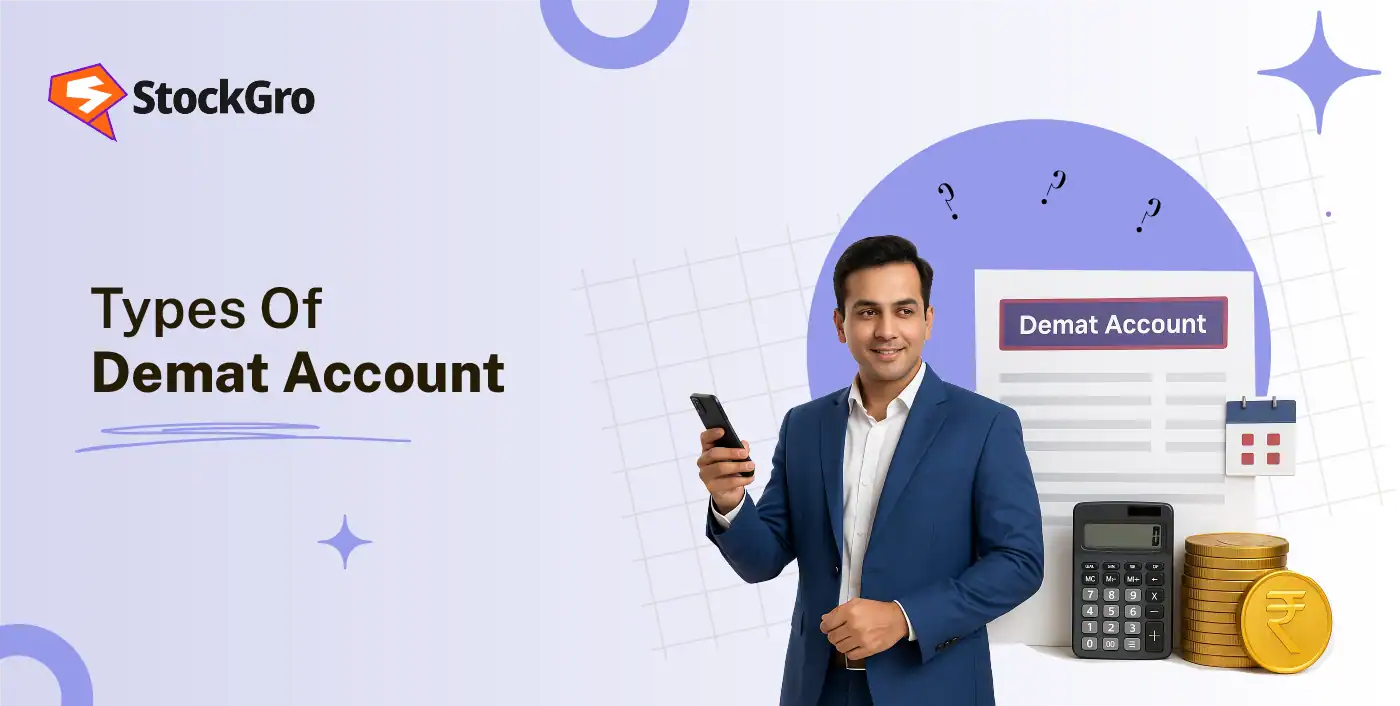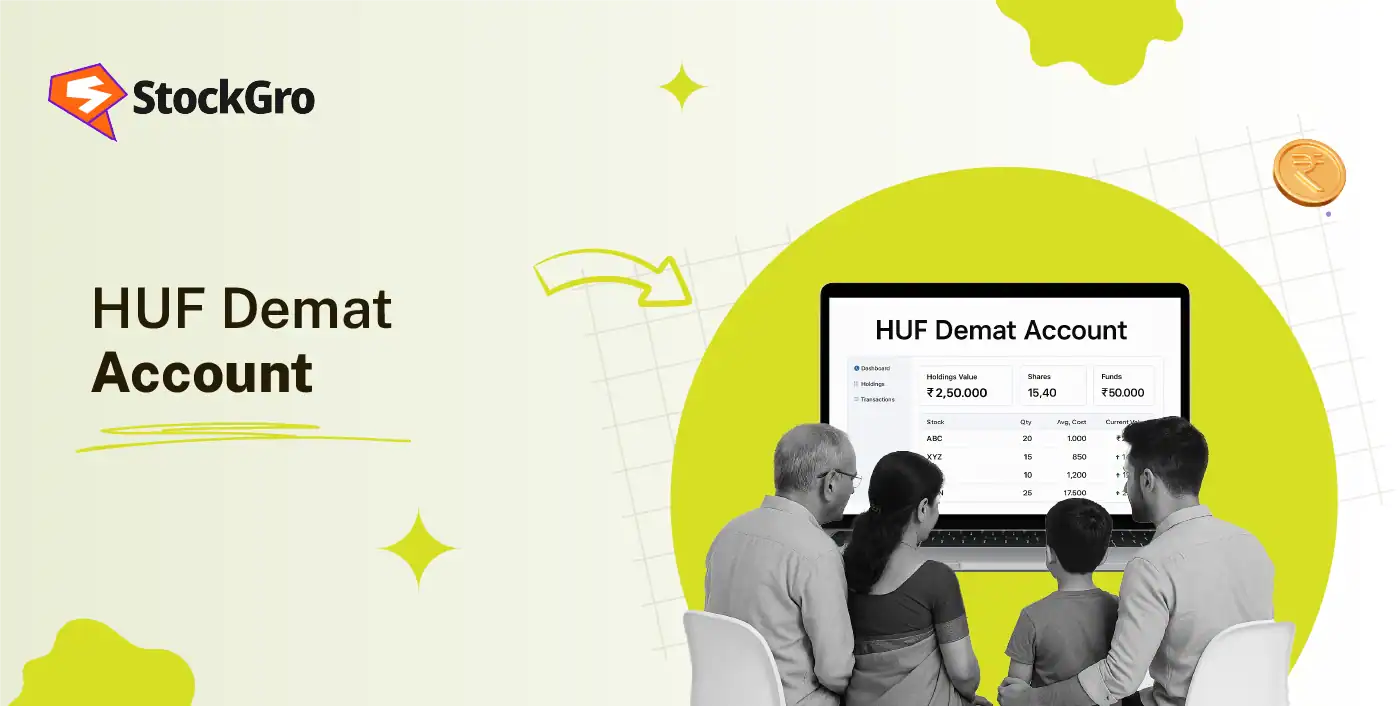
As of July 31, 2025, data from the Central Depository Services Limited (CDSL) and the National Securities Depository Limited (NSDL) indicate that the total number of demat accounts in India has crossed the 20-crore mark. Demat account comes in various types. This blog will examine the types of demat accounts and their suitability.
What is a Demat Account?
A demat account is an electronic account that enables investors to hold their securities and investments in a digital format. In India, an investor must have a demat account to invest in shares, securities, bonds, and others. A range of demat accounts is suitable for distinct investors.
Demat Account Types
Here are the different demat account types for investors, sorted by purpose.
Regular Demat Account
A regular demat account is the preferred option for Indian residents and citizens. It allows investors to buy, hold, and trade a range of financial instruments, including stocks, bonds, mutual funds, and other securities. To keep the account active and usable, an investor must pay annual maintenance charges to the depository broker. They are easily accessible on different online platforms.
Ideal for: Citizens of India who are seeking to invest in Indian equities, securities, mutual funds, bonds, and other financial instruments.
Unique features:
- Gives access to various securities- equities, bonds, mutual funds, IPOs, etc- from one account.
- A small fee may be incurred on transactions.
- Annual maintenance charges are based on the total holdings.
Basic Services Demat Account (BSDA)
The Securities and Exchange Board of India (SEBI) launched the Basic Services Demat Account (BSDA) to provide small investors with a simpler and more cost-effective way to invest. The BSDA provides lower maintenance costs and simplified portfolio management.
Ideal for: Small investors looking for affordable, cost-effective investment account solutions.
Unique features:
- Lower maintenance charges than a regular demat account.
- Typically, no minimum balance requirements.
- Can be transferred into a regular demat account if required.
NRI Demat Accounts: Overview
Non-Resident Indians (NRIs) have the option to invest in India through these NRI demat accounts: repatriable and non-repatriable demat accounts.
Repatriable Demat Account
A repatriable demat account permits NRI investors to invest their money in India and transfer the earnings and initial investment back. Through this account, NRIs can invest in Indian securities, equities, bonds, and more. A repatriable demat account compulsorily needs to be connected to a Non-Resident External (NRE) account. This NRE account is used for all repatriation needs for the NRI investor.
Ideal for: NRI investors seeking to invest in India to repatriate the funds back to the country abroad.
Unique features:
- Supposed to be linked to an NRE bank account.
- The repatriable amount is limited to $1 million per fiscal year.
- Simple management process.
- Opening this account may require extra documents to prove NRI status.
Non-Repatriable Demat Account
A Non-repatriable demat account is a demat account for NRIs that does not offer the privilege of sending the funds and capital gains back to their portfolio abroad. This account is connected to a Non-Resident Ordinary (NRO) account. The idea is to hold the funds in India.
Ideal for: NRI investors seeking to invest in India and planning to keep the funds and gains within India.
Unique features:
- Linked to an NRO account only.
- May require less documentation than a repatriable account.
- International transfer of funds is not possible.
Ownership Structures
Demat accounts can be distinguished by the ownership structures of the accounts as well. Here are the three categories of demat accounts by ownership structures.
Joint Demat account
A demat account opened collectively by two or more individuals is known as a joint demat account. In such an account, one person is designated as the primary holder, while the others are listed as secondary holders.
Ideal for: Couples or investors interested in opening a collaborative investment account.
Unique features:
- Single account for multiple investors, typically up to three.
- All holders are given equal access.
- Upon the primary account holder’s demise, the account can be seamlessly transferred to the other holders.
3-in-1 Demat
A 3-in-1 demat account includes the facilities of trading, demat, and a bank account in a single account. Funds can be moved seamlessly between savings and demat accounts. This account acts as a unified banking system for investing, trading, and savings functions. Let’s check out the 3-in-1 account features here:
Ideal for: Investors seeking convenience in managing multiple functions of their bank and demat accounts.
Unique features:
- Simplified access to all three major functions, such as trading, demat, and banking.
- Simple account opening process.
- Seamlessly transfer funds between bank and demat accounts.
Corporate Demat account
Corporations, too, can open a demat account to manage their portfolio and investments. A corporate demat account is an electronic version used by organisations to hold and manage their entire portfolio of securities in digital form. Businesses can open a corporate demat account that allows smooth and efficient trades and investment management.
Ideal for: Companies and entities with various legal structures—such as private limited firms, Limited Liability Partnerships (LLPs), and trusts—are eligible to open a corporate demat account.
Unique features:
- Efficient portfolio management for tracking, maintaining, and managing investments.
- Tax benefits such as exemptions and deductions, like treating futures and options (F&Os) losses as business losses.
- An organisation’s auditing processes can be simplified.
Choosing the Right Demat Account
Are you confused about which demat account to choose from? Here’s your simple guide:
- Small Investors: If you are looking to invest small amounts and are confused about where to begin, you can consider a BSDA. Otherwise, a regular demat account is usually preferred.
- Residency status: If you are an Indian citizen, a regular demat account is preferred. However, if you are an NRI, a repatriable or non-repatriable demat account should be considered.
- Couples/families: If a couple or a family wants to jointly open a demat account, consider a joint demat account.
Conclusion:
Selecting the right demat account begins with understanding the various types offered in India. A demat account acts as a unified platform that simplifies investment storage and portfolio management.
FAQs
The different types of demat accounts available in India are categorised based on basic, ownership, and residency status. Two basic demat accounts are: Regular Demat Account and Basic Services Demat Account (BSDA). Based on residency status: Repatriable Demat Account and Non-Repatriable Demat Account. Based on ownership structures: Joint Demat Account, 3-in-1 Demat Account, and Corporate Demat Account.
The suitability of each demat account differs for different investors. For example, an Indian citizen looking to start investing regularly can consider a regular demat account. A small investor can consider a BSDA. NRIs can invest in either a repatriable or non-repatriable demat account.
Yes, an investor can operate using multiple demat accounts in India. An investor can open multiple accounts with different brokers, using the same PAN card.
Typically, there is no minimum balance required in a demat account. You can also have a zero balance, and the account can still be functional.
You can avoid any significant demat charges by maintaining a single demat account instead of multiple ones. This way, you can avoid paying multiple maintenance and service charges.

